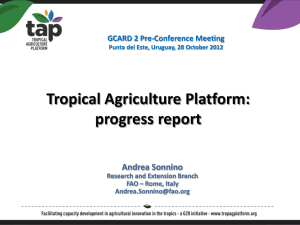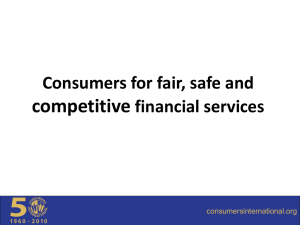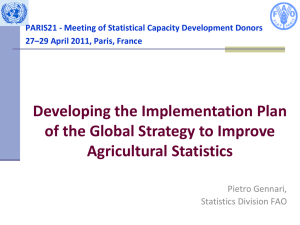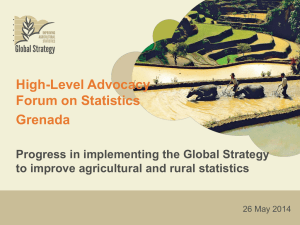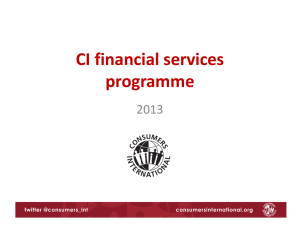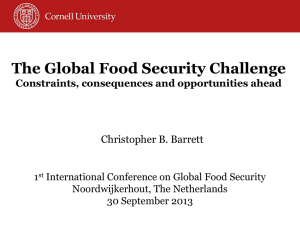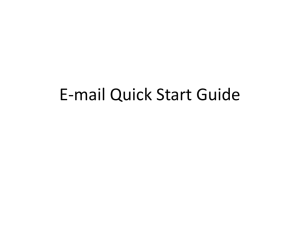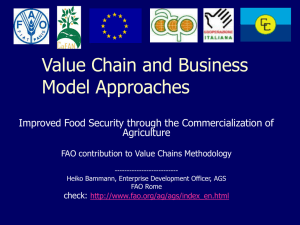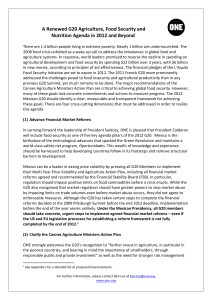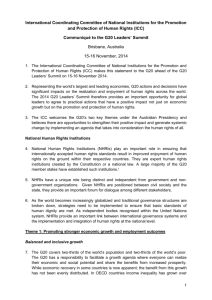Tropical Agriculture Platform
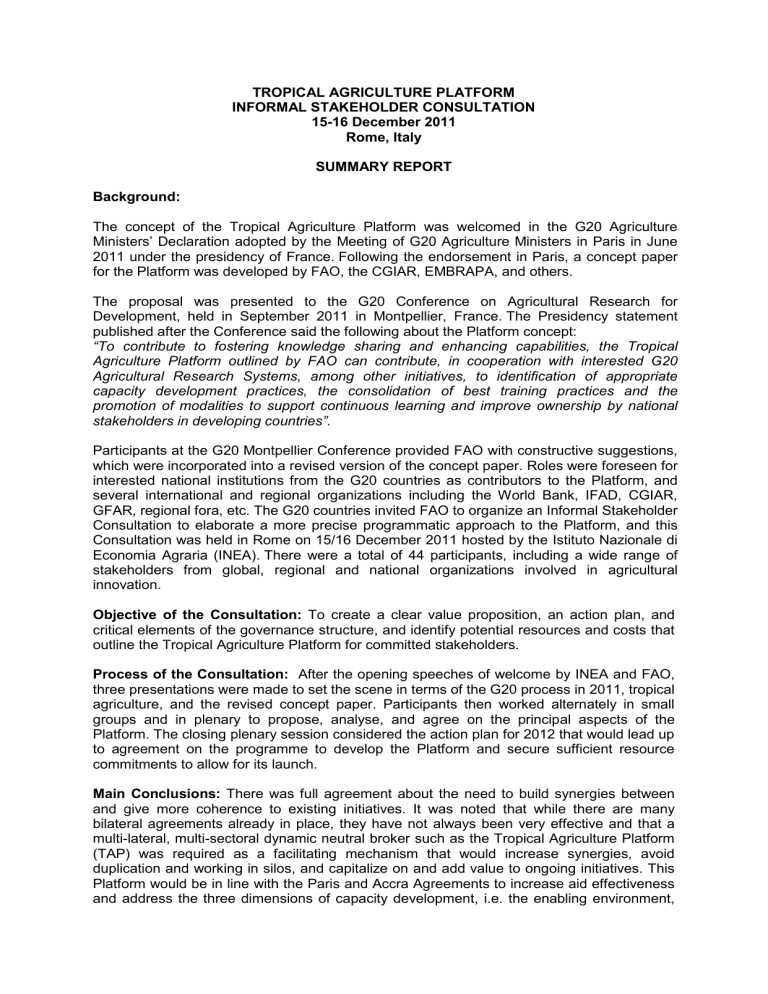
TROPICAL AGRICULTURE PLATFORM
INFORMAL STAKEHOLDER CONSULTATION
15-16 December 2011
Rome, Italy
SUMMARY REPORT
Background:
The concept of the Tropical Agriculture Platform was welcomed in the G20 Agriculture
Ministers’ Declaration adopted by the Meeting of G20 Agriculture Ministers in Paris in June
2011 under the presidency of France. Following the endorsement in Paris, a concept paper for the Platform was developed by FAO, the CGIAR, EMBRAPA, and others.
The proposal was presented to the G20 Conference on Agricultural Research for
Development, held in September 2011 in Montpellier, France. The Presidency statement published after the Conference said the following about the Platform concept:
“To contribute to fostering knowledge sharing and enhancing capabilities, the Tropical
Agriculture Platform outlined by FAO can contribute, in cooperation with interested G20
Agricultural Research Systems, among other initiatives, to identification of appropriate capacity development practices, the consolidation of best training practices and the promotion of modalities to support continuous learning and improve ownership by national stakeholders in developing countries”.
Participants at the G20 Montpellier Conference provided FAO with constructive suggestions, which were incorporated into a revised version of the concept paper. Roles were foreseen for interested national institutions from the G20 countries as contributors to the Platform, and several international and regional organizations including the World Bank, IFAD, CGIAR,
GFAR, regional fora, etc. The G20 countries invited FAO to organize an Informal Stakeholder
Consultation to elaborate a more precise programmatic approach to the Platform, and this
Consultation was held in Rome on 15/16 December 2011 hosted by the Istituto Nazionale di
Economia Agraria (INEA). There were a total of 44 participants, including a wide range of stakeholders from global, regional and national organizations involved in agricultural innovation.
Objective of the Consultation: To create a clear value proposition, an action plan, and critical elements of the governance structure, and identify potential resources and costs that outline the Tropical Agriculture Platform for committed stakeholders.
Process of the Consultation: After the opening speeches of welcome by INEA and FAO, three presentations were made to set the scene in terms of the G20 process in 2011, tropical agriculture, and the revised concept paper. Participants then worked alternately in small groups and in plenary to propose, analyse, and agree on the principal aspects of the
Platform. The closing plenary session considered the action plan for 2012 that would lead up to agreement on the programme to develop the Platform and secure sufficient resource commitments to allow for its launch.
Main Conclusions: There was full agreement about the need to build synergies between and give more coherence to existing initiatives. It was noted that while there are many bilateral agreements already in place, they have not always been very effective and that a multi-lateral, multi-sectoral dynamic neutral broker such as the Tropical Agriculture Platform
(TAP) was required as a facilitating mechanism that would increase synergies, avoid duplication and working in silos, and capitalize on and add value to ongoing initiatives. This
Platform would be in line with the Paris and Accra Agreements to increase aid effectiveness and address the three dimensions of capacity development, i.e. the enabling environment,
Institutional and individual capacities. The Platform would also be in accordance with the
Global Conference on Agricultural Research for Development (GCARD) Roadmap.
There was general consensus that TAP would facilitate and advocate capacity development programmes, and not directly execute or implement them. It would foster collective action to enable existing international representative bodies, including the Global Forum on
Agricultural Research (GFAR), the Global Forum for Agricultural Advisory Services (GFRAS) and the Global Confederation of Higher Education Associations for the Agricultural and Life
Sciences (GCHERA), together with regional bodies to work together more effectively, thus offsetting transaction costs and leveraging their resources and connections.
It was agreed that the governance structure of TAP should be light, flexible, open, inclusive, and based on simple operating procedures. The members of the Platform should ideally comprise a coalition of willing and committed partners/constituents including the national agricultural research, education and extension institutions as well as the private sector, civil society and farmers’ organizations in the G20 and developing countries, and the key regional and international for a, networks and agencies. The Platform would be facilitated by a secretariat located in and managed by FAO. An advisory committee could be set up to oversee the Platform activities. National and regional focal points could also be appointed for more harmonized and collaborative support.
Regarding the geographical scope of the Platform, the stakeholder consultation proposed that it should be focused on, but not be limited to, the Least Developed Countries (LDCs) to encompass the entire tropical region, since the region is characterized by pervasive poverty and is home to the vast majority of the world’s 1 billion undernourished people. It was further proposed that the range of the Platform could be expanded to include developing countries of subtropical and temperate areas.
The issue of distinguishing between the direct and indirect beneficiaries, so that the activities of the Platform could be better defined, was also raised. It was agreed that the “target groups” that would form the constituency and will be directly affected by the platform activities would be the national agricultural research systems, educational institutions, farmers’ organizations and rural advisory services, while the ultimate “impact groups” of the
Platform would be the small and medium scale farmers.
There was general accord regarding the following outputs and activities of the Platform:
(1) an assessment of institutional and individual capacities to identify and monitor gaps, and to map existing partnerships and initiatives as well as available resources;
(2) based on the first output, a strategic action plan would be formulated with capacity development priorities for collective action, which would then be coordinated by regional and international bodies to achieve three further inter-related outputs:
(3) policy dialogue and advice at different levels (for example, by convening events as well as taking advantage of existing international events to focus on capacity development and production of toolkits for policy-makers);
(4) a “marketplace” to articulate and match demand and supply offers for capacity development of individuals and organizations (for example, by documenting offers for fellowships, scholarships and training opportunities, and bi-annual events for networking, competition as well as priority setting) and to identify the potential strengths and weaknesses of existing initiatives and optimize complementarities; and
(5) sharing of information and knowledge on tropical agriculture (for example the developmen t of a “TAPipedia” and publications of guidelines, lessons learned, good practices and case studies in capacity development).
Key assumptions that would potentially impact on the success of the Platform include, but are not limited to, endorsement of the Platform outputs and activities by the G20, buy-in and
ownership by relevant stakeholders, availability of resources (both financial and in-kind) and willingness of partners to share information.
Next Steps: It was agreed that a draft summary report of the meeting would be circulated to all the participants for inputs before finalization. Subsequently, a detailed meeting report would be prepared and transmitted to all the stakeholders who were invited to the meeting, including the ones who were unable to attend. A programme proposal for the Platform would then be drafted by a team (Guido Bonati, INEA; Robin Bourgeois, GFAR; Salvador
Fernandez Rivera, INIFAP; Christian Hoste, Agreenium, Paolo Eduardo de Melo,
EMBRAPA; Paolo Sarfatti, IAO/Agrinatura; FARA representative; FAO staff), shared with all relevant stakeholders and finalized based on the feedback received. The programme proposal would be presented to the G20 Agricultural Ministerial Meeting in May 2012. It would also be made available to other meetings scheduled in 2012, including the TEAM
Africa meeting in Wageningen (February 2012), the FORAGRO meeting in Peru (June 2012) and the 2nd GCARD in Uruguay (October 2012).
Timeline
1) Meeting report a) Draft summary meeting report to be shared with participants by 21 December 2011
(FAO); b) Feedback on summary report to be provided by 6 January 2012 (all participants); c) Detailed draft meeting report including Annexes to be shared by 15 January 2012
(FAO); d) Feedback on detailed draft meeting report to be provided by 20 January 2012 (all participants); e) Final report to be shared with all stakeholders invited to the meeting by 24 January
2012 (FAO).
2) Programme proposal for TAP a) Draft programme proposal to be drafted between the last week of January and first week of February 2012 via email and teleconferences (drafting team); b) Draft TAP proposal to be shared with participants by 10 February 2012 (drafting team); c) Review and feedback on the draft proposal to be provided by 20 February 2012 (all participants); d) Proposal to be finalized before the end of February (drafting team); e) TAP work plan to be refined in April and May 2012 (drafting team).
3) Aiming for political and financial support to TAP a) G20 i) Information on schedule of next G20 expert meeting to be provided to the drafting team as soon as possible (Salvador Fernandez Rivera, INIFAP); ii) Results of the stakeholder meeting and the programme proposal to be presented to the G20 expert meeting, scheduled probably in mid-March 2012 (FAO); iii) TAP proposal to be presented to the G20 Agricultural Ministerial Meeting aiming to get endorsement, probably in May 2012 (FAO). b) Other meetings relevant to TAP i) Progress on TAP proposal to be communicated at the preparation meeting for 2 nd
GCARD, end of January 2012 (Andrea Sonnino, FAO) ii) GFAR sub-working group on capacity development to be informed and mobilized by 15 January 2012 (Courtney Parsley, GFAR) iii) TAP proposal to be presented at the TEAM Africa meeting, probably at the end of
February 2012 (FAO)
iv) TAP programme proposal to be presented at the FORAGRO meeting in Lima,
Peru in June 2012 (FAO) v) TAP programme proposal to be presented at the 2 nd GCARD in October 2012
(FAO)
